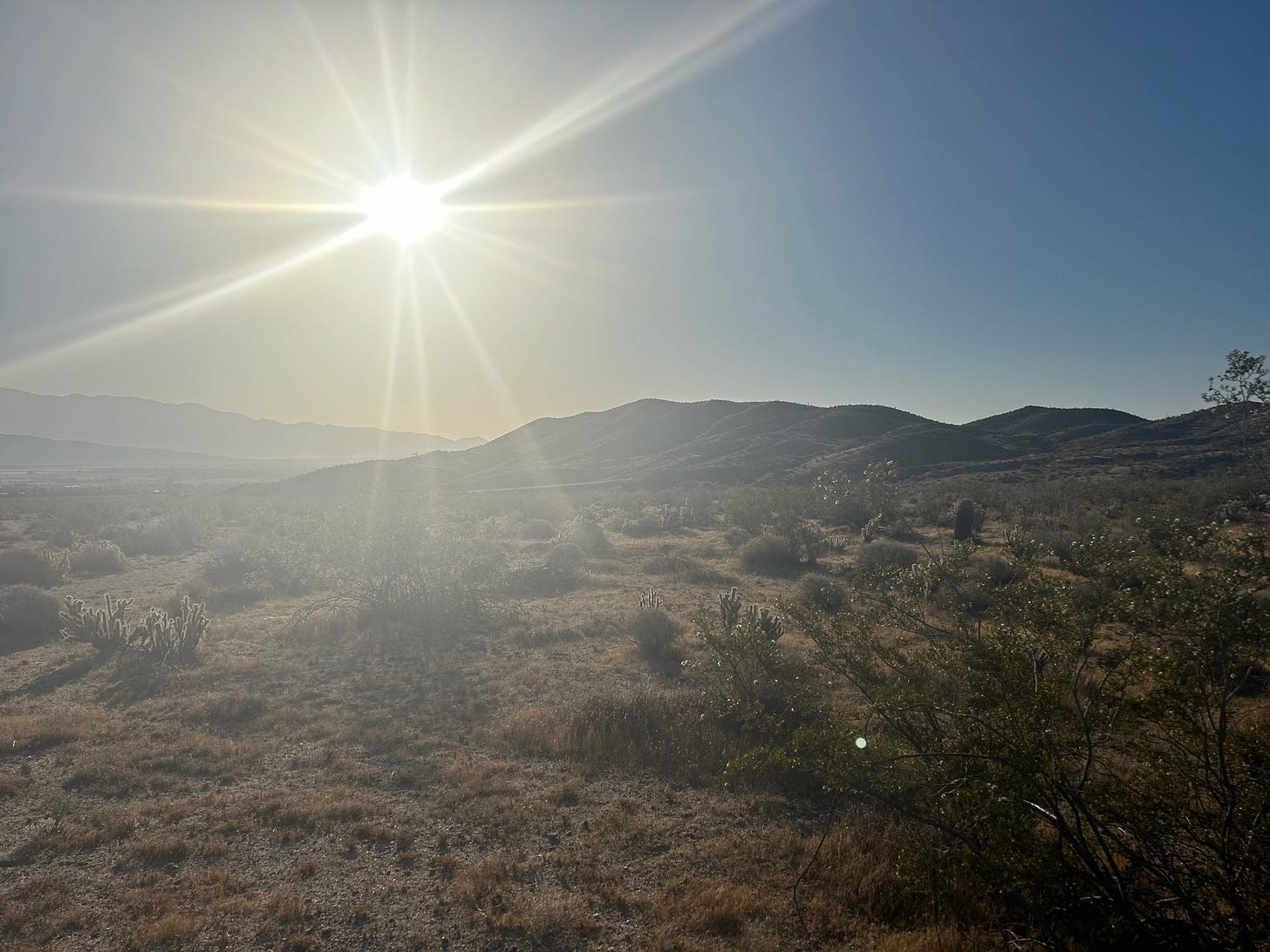In the summer I like to get away, far away. Across the ocean, deep into the desert, on top of a mountain, lost in the forest. One of the places where it’s easy to get to quickly to escape the throng is the local desert during the intense heat. Once it climbs to over a hundred degrees, even many of the locals flee and those of us coming to be alone can rise at dawn and go on a solitary wander down lonely trails without a soul in sight.
What is to be gained here in the middle of nowhere with no one to be found? Nothing. And that’s the point. There is something primordial about it.
As Kim Haines-Eitzen puts it in Sonorous Desert, “The idea that a dark stillness, or more specifically a dark silence, existed in the beginning of time reflects, I think, a human longing for silence and also a deep sense of silence’s power.”
Ancient monks, she tells us, practiced “Hesychia which could mean ‘silence,’ ‘solitude,’ ‘quiet,’ or ‘stillness’ . . . It was, and is, a simple word that took on deep significance for Christian monasticism in the eastern Mediterranean. Hesyschiawas contrasted with disturbance: practicing heyschia or living in hesyschia or living in hesychia meant freedom from disturbance of noise, disturbance of distraction, the interruptions of sound.”
Coming from the city and the noise and busyness of life as we’ve constructed it leads us to feel disrupted by stillness, emptiness, or at least the openness that we imagine as nothingness even though it too is a place full of its own spare music.
But still, on the open trail, things fall away. There is light and shadow and deafening quiet interrupted by the whoosh of wind, the rustle of birds’ wings, and the sound of one’s own footsteps.
Somehow, something is born inside of you, but you don’t know what it is, and you try to nurture it, help it through its fragile infancy.
Haines-Eitzen relays an old tale:
An elder said, “In the same way that no plant whatsoever grows upon a well-trodden highway, not even if you sow a seed, because the surface is trodden down, so it is with us. Withdraw from all business into heyschia and you will see things growing that you did not know were in you, for you were walking on them.” Here, the quality of inner stillness that is hesychia is something one tends and nurtures like a seedling. It can be walked upon and crushed, extinguished.
Thomas Merton describes the quality of such experience as “A certain atmosphere of silence . . . a deeply simple way of prayer.” As Haines-Eitzen notes, “A silence born of presence and attention, atmospheres of silence, silences that manifest a whole world—the images of silence seem all the more urgent in our busy modern lives.”
But really there is not actual silence but simply less noise. There is space for singular sounds to enter and interplay with others. You have to learn how to hear properly to be present to it as you sit by the pool in the sweltering heat in the vacant hotel by the mountain. As Walt Whitman wrote, “Now I will do nothing but listen . . . I hear all sounds running together, combined, fused or following.”
There are the jackrabbits rustling through the bushes, ravens landing on the palm trees. What sound does the roadrunner make, the snake, the bighorn sheep? And what is the sound of the mountains? The boulders with their deep hearts of stone?
The scorching heat rises and falls. Night comes slowly with a sky full of stars.
The next day I will wake in the quiet darkness and walk into the pregnant dawn.
Note on the Summer Chronicles:
A decade ago, during my time writing for the OB Rag and SD Free Press, I penned a series of pieces over the summer that moved beyond the blog/column form to something a little looser and more open to improvisation and the poetic turn. Last summer, a health crisis intervened, but I made it through to the other side of that and here I am again, writing, word by word, breath by breath.
Below is the original preface for the first series of chronicles:
In the summer of 1967, the great Brazilian writer, Clarice Lispector, began a seven year stint as a writer for Jornal de Brasil [The Brazilian News ] not as a reporter but as a writer of "chronicles," a genre peculiar to Brazil. As Giovanni Pontiero puts it in the preface to Selected Chrônicas, a chronicle, "allows poets and writers to address a wider readership on a vast range of topics and themes. The general tone is one of greater freedom and intimacy than one finds in comparable articles or columns in the European or U.S. Press."
What Lispector left us with is an eccentric collection of "aphorisms, diary entries, reminiscences, travel notes, interviews, serialized stories, essays, loosely defined as chronicles." As a novelist, Pontiero tells us, Lispector was anxious about her relationship with the genre, apprehensive of writing too much and too often, of, as she put it, "contaminating the word." It was a genre alien to her introspective nature and one that challenged her to adapt.
More than forty years later, in Southern California—in San Diego no less—I look to Lispector with sufficient humility and irony from my place on the far margins of literary history with three novels and a few other books largely set in our minor league corner of the universe. Along with this weekly column, it's not much compared to the gravitas of someone like Lispector. So, as Allen Ginsberg once said of Whitman, "I touch your book and feel absurd."
Nonetheless the urge to narrate persists. Along with Lispector, I am cursed with it—for better or worse. So for a few lazy weeks of summer, I will try my hand at the form.




